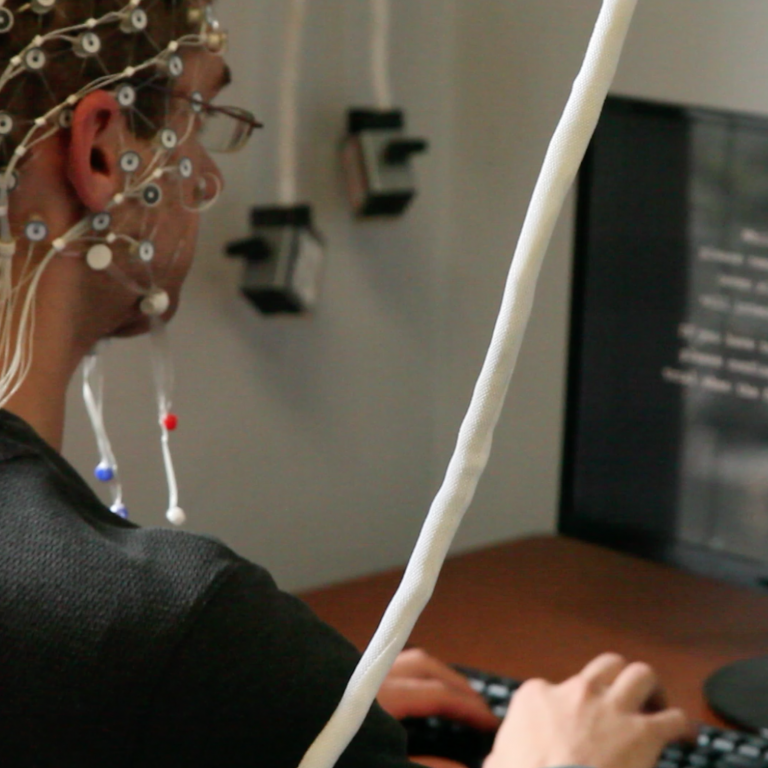Richard J. Davidson, PhD, is a renowned neuroscientist and one of the world’s leading experts on the impact of contemplative practices, such as meditation, on the brain. He is the founder of the Center for Healthy Minds at the Waisman Center, University of Wisconsin-Madison.
The following is an excerpt from the documentary film The Science of Wisdom. In this interview, Dr. Davidson discusses how he came to studying meditation from a neuroscientific perspective, the role of the prefrontal cortex in meditation, the interaction of meditation and immunocompetance, and the intersection of wisdom and contemplative practice.
Jean: As a neuroscientist, how did you come to studying mindfulness?
Dr. Davidson: Well, it really goes back to the very early stages of my graduate career. I was blessed with the opportunity to meet a number of people who are very warm-hearted and generous. They were people whose presence and demeanor were very infectious to me. They were the kind of people I really wanted to spend more time around and, for the most part, they were not my professors in the academy. They were people I was lucky enough to meet on the outside. This was the mid-1970's, and I learned that they all had an interest in the practice of meditation. That led me to begin my lifelong journey. After my second year at graduate school, I went off to India for the first time and got a taste of intensive meditation practice myself. I came back with a very fervent aspiration that this is something important, but the zeitgeist was not permissive for this kind of work at that time. I then became a closet meditator for many years, and then things began to change.
Jean: So, when did things begin to change?
Dr. Davidson: Well, the moment they began to change was a very distinct moment when I first met His Holiness, the Dalai Lama. The Dalai Lama had heard about the work I was doing and knew I was interested in these areas. He encouraged me and a couple of other people to begin to investigate the possibility that the minds and the brains of individuals, who spent years training their mind, may actually be different and that we may learn something using modern neuroscientific methods. So I met with him in 1992, and he challenged me on that day. He said [something like], “Look, you’ve been using tools of modern neuroscience to study anxiety and fear and depression. Why can’t you use those same tools to study positive qualities in the mind?” That was a wake up call. Since that time, it’s what we've been doing; and I have become much more public about my interests in these areas. I’ve been doing everything I can to stimulate research in this area, to conduct research, and to spread the word that well-being is something that can be cultivated.
Jean: I think it was a good challenge! (laughter) What are some of the specific benefits that you have found with the combination of neuroscience and meditation in terms of well-being?
Dr. Davidson: Well-being is a kind of global construct. It's helpful to really understand particularly from a neuroscientific perspective what some of the constituents might be which can be empirically tractable to a neuroscientist like myself. So, for example, one of the benefits that we have studied intensively in the laboratory is surrounding attention. In 1890, William James in his Principles of Psychology talked about the possibility of educating attention. He said an education which should improve this faculty (talking about attention) would be the education par excellence, but he didn’t have any sense of how that might be done. And I think if he had contact with these contemplative traditions, he would have instantaneously seen if nothing else, these are the methods and strategies that can be used to educate on attention. There is now good neuroscientific research that indicates that certain parameters of attention can indeed be trained using these methods. So, that’s one example. Another example is more in the emotional domain, which is an area that we are particularly interested in and one of the constituents of resilience we think is the rapidity with which you recover from adversity. People who recover more quickly are more resilient; and the people who have a persistent negative response to adversity and whose negative emotions permeate subsequent activities in which they engage have a more difficult time. We, in our research, have found that meditation can facilitate this particular constituent of resilience and can help people recover more quickly from adversity. So, that’s another example.
Jean: In 2003, you reported on the effects of mindfulness-based stress reduction on the dorsolateral prefrontal cortex (DLPFC). Would you discuss more about the prefrontal cortex, and how it’s affected by various forms of attention training?
Dr. Davidson: Well, you are asking an interesting and complicated question regarding the impact of meditation on the prefrontal cortex. The prefrontal cortex is a big chunk of real estate in the front of our brain that engages in many different functions. The prefrontal cortex is larger in humans relative to the rest of the brain mass than in any other species; and it probably has a lot to do with some of the qualities of behavior that we regard as distinctively human, particularly the ability to plan for the future or to recollect from the past and so forth. These are qualities which enable fantastic capability. There are also qualities that can snare us. They are qualities that enable us to not be ‘in the present moment’ and probably are cause for great amounts of suffering. The prefrontal cortex is also very involved in the regulation of emotion. I think it’s fair to say, the ability or the likelihood of dis-regulating emotion or the incidence of psychopathology is much greater in humans than it is in any other species probably because of the prefrontal cortex. We can then begin to ask questions about how different forms of meditation may impact prefrontal function. There are different territories of the prefrontal cortex that may be affected by different kinds of training. It’s important to underscore the fact that research in this area is still very much in its infancy. There is some research which indicates that functional activity in certain regions of the prefrontal cortex is altered by mindfulness meditation. Compassion meditation appears to increase activity in this region as well. The consequences of changes in this region include improvements in certain aspects of attention. For example, being able to selectively attend voluntarily to certain stimuli and ignore others, and also the capacity to focus our mind on wholesome qualities like compassion appear also to be importantly dependent upon activation of the prefrontal cortex. So, we have found in a variety of different studies that different kinds of meditation share in common an impact on circuits involving the prefrontal cortex.
Jean: In a few of your papers that you have co-authored, you’ve made mention of neurocognitive benefits with meditation, how does that work for the average person if they were to start meditating? How might they see these differences in their brain function or in their physiology?
Dr. Davidson: Well, one of the things that I often talk about is the important discoveries particularly over the last 10 or 15 years in the understanding of how the brain communicates with the body. There are massive bidirectional highways that exist between the brain and the body and these pathways are the pathways through which activity in the brain influences the body and in turn activity in the body can modulate functions of the brain. This is why changing the brain by transforming the mind can actually impact the body. It’s also why practices, which directly work on the body like aerobic exercise, yoga, and many other kinds of strategies that directly impact the body, modulate the brain in ways that are potentially consequential. So, one of the things that we've investigated is how brain changes that are induced by meditation, may actually influence peripheral biological changes. By peripheral biological, we mean biology below the neck that may impact health; and we have found that parameters of immune function are modulated in this way. We found that 2 months of the mindfulness meditation training program can actually boost your responses to flu vaccine, and make you more resilient in response to exposure to flu virus. We have also found other, both endocrine and immune changes that occur with meditation practice. These findings are part of the growing corpus of scientific literature that suggests that the changes in the brain that are induced by these meditation practices don’t just stop at the brain, but they also affect the body in ways that may actually promote better physical health.
Jean: More recently, you have published papers where you introduced mindfulness into classrooms? What kinds of results have you found from these studies?
Dr. Davidson: Well, one of the things we’ve learned from modern neuroscience is that the brain is plastic throughout life. It can change throughout life. However, having said that, it’s also important to recognize that there are what scientists have called “sensitive periods” of development where the brain is especially plastic. Two of these periods are right around the onset of schooling between the ages of 5 -7 years, and also the period around adolescence. These are times when the brain is massively reorganized and is also more sensitive to various kinds of environmental inputs; and thus can be shaped in dramatic ways. Based on those considerations, we decided that interventions to cultivate mindfulness and kindness in children particularly in the sensitive periods may be especially helpful in providing building blocks for kids that can then provide support as they go through development in a way that would enable these changes to have multiplicative benefits as the kids develop. We’ve been systemically examining, using rigorous randomized control trials, the application of certain kinds of curricula. We developed what we call a kindness curriculum which is a curriculum for kindness and mindfulness practices for preschool kids. We’re teaching this in kids who are aged 4 and 5 years of age in public schools here in Madison, Wisconsin; and we’re evaluating the impact of this in rigorous randomized control trials. We just had our first scientific paper come out on the impact of the kindness curriculum in the last couple of weeks where we document benefits on objective measures of attention, on cognitive control, the ability to delay gratification, and measures of social behavior like the extent to which children share with other children and are cooperative. We have found gains on many of these measures as well as gains on grades that they receive from their regular classroom teachers. The kids who went through the intervention are rated by their teachers doing significantly better than their controlled counterparts, who’ve not gone through these procedures, on a number of dimensions that teachers regularly rate the students on. So, I think that these strategies, which can be taught in a completely secular way, have great promise in providing the scaffolding for healthy trajectories of development. One of the key attributes of all forms of learning is attention. If you’re not paying attention to what is (what you are exposed to), you’re not going to be able to learn it nearly as well. This to me is so fundamental. So if we can teach children to be better able to regulate their attention, it will have benefits in virtually all spheres. And so, this is something that we’re excited about, and we think is showing a lot of promise and deserves much more serious attention from the research community.
Jean: There has been some recent research with meditation and wisdom. Would it be fair to say that you think there could be a link between wisdom and meditation in terms of a healthy society?
Dr. Davidson: A wonderful question. With respect to wisdom, of course, a lot depends on how wisdom is defined. I think the way wisdom is defined in Western scholarship is probably somewhat different than the way it’s defined in the Indo-Tibetan context or in the contemplative traditions. Putting aside those possible differences, I think that from where I sit I would say that the contemplative traditions have a lot to contribute to understanding of and the cultivation of wisdom. I would say that these are traditions which hold that wisdom is something that indeed can arise as a consequence of these kinds of practices. A very significant component of wisdom, I think, is understanding the fundamental nature of the mind. I think for wisdom to really be embodied wisdom, it’s critical that an individual have that kind of deep understanding of her- or himself, and that kind of deep understanding I think can arise through certain kinds of contemplative practice. In fact, I would go so far as to say that for the true embodiment to that kind of wisdom, these kinds of practices are necessary.
Reference
Boulware, J. R. & Matelski Boulware, J. L. (Producer), & Boulware, J. R. (Director). (2015). The Science of Wisdom [Motion picture]. USA: The JJ Effect.

Richard J. Davidson, Ph.D.
Professor of Psychology, University of Wisconsin–Madison





